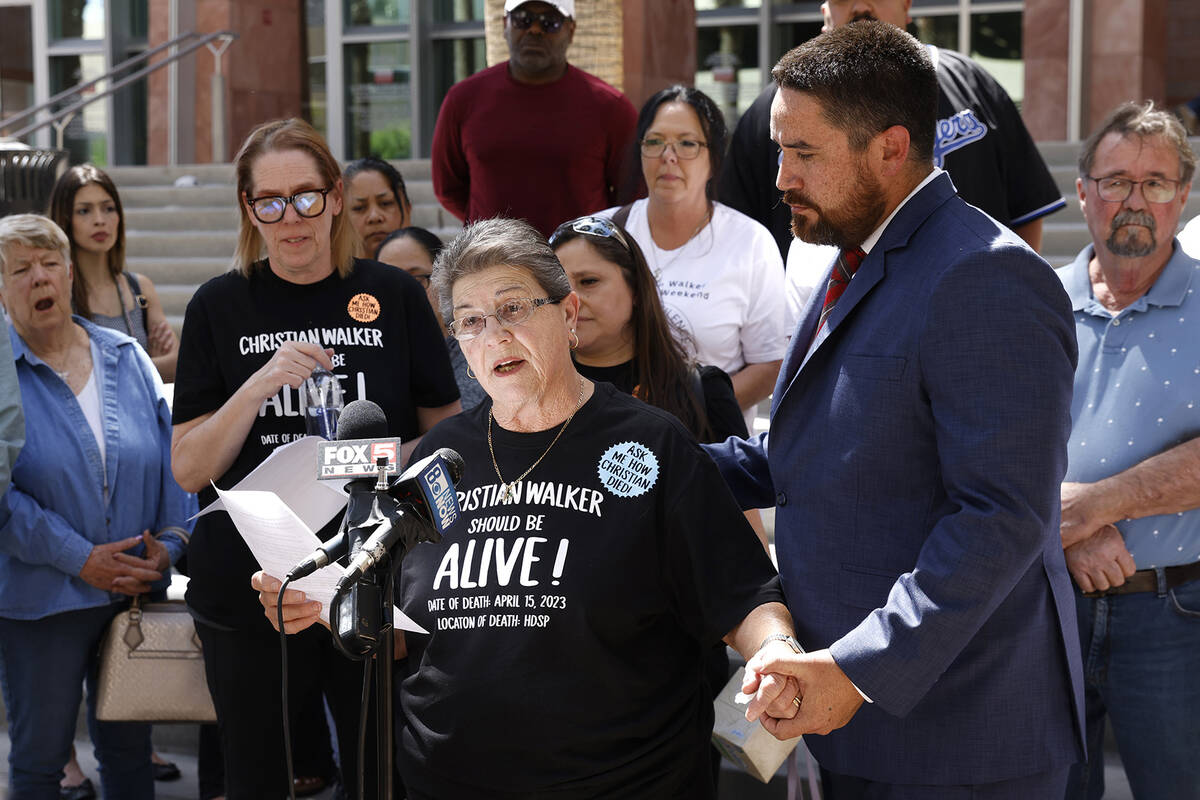Prisoner advocates hail success as judge declines to toss suit alleging coverup
A judge on Tuesday dismissed only part of a wrongful death lawsuit filed against the Nevada Department of Corrections alleging that the death of an inmate who was beaten before being found unresponsive in his cell had been “swept under the rug.”
The decision was hailed as a success by prisoner rights advocates in attendance.
Christian Walker, 44, died at High Desert State Prison, which is around 40 miles northwest of Las Vegas, on April 15, 2023. A copy of a redacted autopsy report showed that Walker had suffered blunt force trauma to his head, neck, torso, shoulder and legs.
The Clark County coroner’s office determined that the injuries were “not considered fatal” and did not contribute to Walker’s death, which was ruled natural due to hypertensive cardiovascular disease.
The lawsuit alleges that the director of the Nevada Department of Corrections, James Dzurenda, alongside two High Desert wardens, conspired with the Clark County coroner’s office to label Walker’s death as natural rather than caused by injuries from a fatal beating by corrections officers.
The Nevada Department of Corrections and Clark County coroner’s office did not immediately respond to requests for comment.
Walker was serving a life sentence with the possibility of parole for the 1997 killing of his 17-year-old girlfriend Maureen McConaha, the Review-Journal previously reported.
Found lying in a pool of blood
Both the lawsuit, filed by Christian Walker’s mother, Annette Walker, and autopsy report said that he was taken to University Medical Center two days before his death after corrections officers used force against him and struck him with batons.
After being taken back to the prison, he was found unresponsive in his cell on the day of his death. According to the lawsuit, he was found lying in a pool of blood. Graphic photos attached to the lawsuit show Walker with swollen black eyes.
While District Judge Mary Kay Holthus dismissed a part of the lawsuit that alleged professional negligence by medical providers due to the absence of an affidavit from a medical expert, the lawsuit remained largely intact and the case is scheduled to go to a jury trial in February 2026.
Around a dozen members of Return Strong, a prisoner advocacy group, gathered in the back of the courtroom, something the group has been doing for months as the case progresses.
Holthus’ decision “made a lot of stress just fall away,” said Michelle Salles, who attended the hearing with Return Strong and has an incarcerated loved one. Walker’s death was “devastating,” Salles said, “especially knowing I still have somebody in there.”
“There’s a people’s version of history, and then there’s the government’s version,” said Jodi Hocking, founder and executive director of Return Strong, who attended Tuesday’s hearing.
‘Fight for every incarcerated person’
Hocking said she and her fellow members of Return Strong are showing up to the hearings to make sure the people’s version is heard.
“The fight for Christian is a fight for every incarcerated person,” Hocking said in a statement. “We are here to ensure that no more lives are lost to unchecked violence behind prison walls.”
The lawsuit said that while the Clark County coroner’s office said Walker died naturally, when his estate enlisted former medical examiner Lary Simms to review the autopsy, Simms said that the circumstances and findings support blunt head trauma as the cause of death.
Simms served as a deputy medical examiner with the Clark County coroner’s office for 19 years, according to his LinkedIn profile.
On Tuesday, prosecutors pushed for the lawsuit to be dismissed. One basis for this dismissal, they argued, was that Walker’s estate hadn’t exhausted all the administrative remedies typically available to inmates.
Does state law apply to an inmate’s estate?
Nevada law requires anyone in the custody of the Nevada Department of Corrections to exhaust all possible administrative remedies, such as submitting complaints through a mediation process established by the attorney general’s office, before suing the department.
Holthus interrupted Jessica Whelan, chief deputy solicitor general at the attorney general’s office, on Tuesday morning, saying Walker is “not really able to exhaust any remedies.”
Whelan argued that while Walker isn’t able to, his estate should be made to exhaust all administrative remedies first.
Whether or not state law applies also to an inmate’s estate is an issue that Whelan said is currently facing the Nevada Supreme Court in a separate case.
But James Urrutia, Annette Walker’s attorney, said that from a practical standpoint, it’s not possible for an estate to work with the Nevada Department of Corrections to exhaust these remedies.
“Let the Supreme Court sort it out,” Holthus said Tuesday. “It seems to not make a lot of sense to me to require someone who passes away to pursue administrative remedies.”
Contact Estelle Atkinson at eatkinson@reviewjournal.com. Follow @estelleatkinson.bsky.social on Bluesky and @estellelilym on X.

















